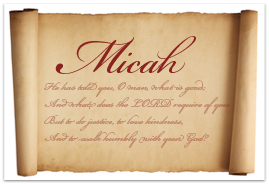June 15, 2009
by Insight for Living Ministries

Little is known about the prophet Micah. His hometown Moresheth lay in Judah’s fertile foothills near the fortified cities Lachish, Maresha, and Soco. It was about twenty-five miles southwest of Jerusalem and so close to the Philistine city Gath that it was often linked with this larger city and called Moresheth-gath.
Most commentators believe Micah was much like Amos, a small farmer or cattleman. Others see him as an important elder in Moresheth, viewing Moresheth itself as an important fortified city. And still others see him as a priest like Jeremiah. We can surmise all we like, but the fact is, we really don’t know. However, we do know much more about his message.
Micah’s message is essentially about “kingdom-of-God-living.” Both Israel and Judah are condemned for violating the covenant standards of God’s kingdom—for showing how God’s people should not live. They were supposed to be a holy nation, a light to the Gentiles; instead, they chose to blend in with the surrounding darkness. Micah contrasts this upside-down picture with the right-side-up portrait of God’s true kingdom, the ultimate messianic kingdom, from which justice, truth, peace, safety, dignity, and mercy inherently flow.
Significantly, God’s character serves as bookends of Micah’s message. It opens with His righteous judgment and closes with His faithful mercy. A subtle clue illuminates this for us: Micah’s name begins the book (Micah 1:1); its meaning in Hebrew—“Who is like God?”—brings the book to a close (7:18).
One way to outline the prophecy of Micah is to divide the book according to Micah’s three messages:
- An Announcement of Judgment (chapters 1-2)
- A Contrast of Kingdom (chapters 3-5)
- A Case against Sin and a Promise of Restoration (chapters 6-7).
(At the climax of this message we find Micah’s key verse, which calls on kingdom-living in the midst of a corrupt world:)
He has told you, O man, what is good;
And what does the LORD require of you
But to do justice, to love kindness,
And to walk humbly with your God? (Micah 6:8)
Not only did Micah’s message spare his generation from Assyrian conquest, but decades later his testimony and the people’s response to it saved the life of Jeremiah. Micah’s mission was accomplished in those days.
Will it be accomplished in ours?

Written by Insight for Living Ministries staff members.
More articles by Insight for Living Ministries